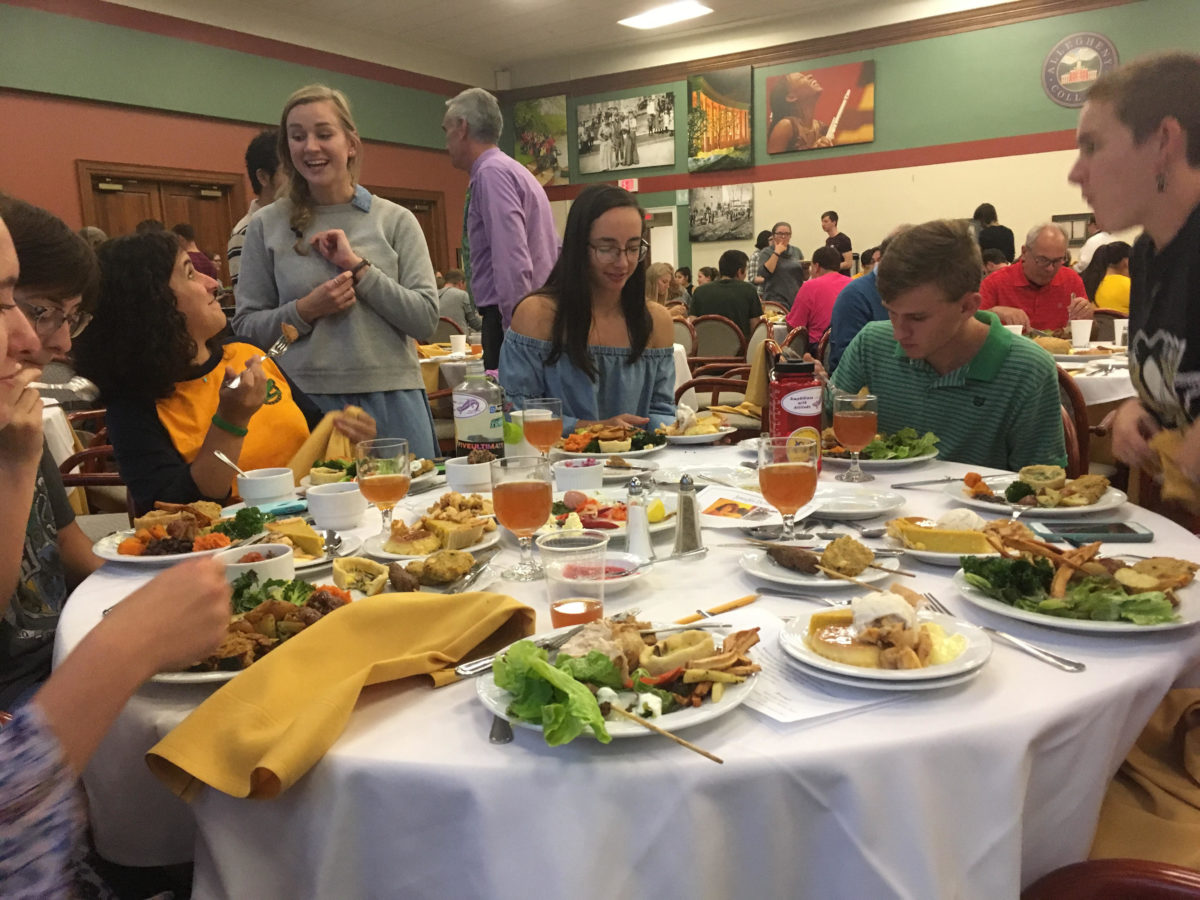
DeHart Market and Dinner Features Nature’s Bounty
More than 250 diners who were lucky enough to get tickets to the 15th Annual DeHart Dinner and Market at Allegheny College on Wednesday, October 4, feasted on dishes like sweet potato and carrot puree, kofta with yogurt sauce, and maple ice cream, all grown naturally and healthfully.
Tickets for the dinner were sold out in a record 90 minutes this year, according to organizers. The culinary event honors Jennifer DeHart, an Environmental Science professor who died in 2010 after a five-year battle with cancer.
The dinner was preceded by a market on campus. The band Salmon Frank provided an enthusiastic soundtrack while vendors set up at tables, selling their produce straight to shoppers. Other activities included a game of cornhole, a stationary bike that generates electricity, and table where Nancy Schultz sells flowers.
To get the dinner started in Schultz Banquet Hall, diners were greeted by three coffee dispensers that read “Decaf,” “Outdoorsy Sumatra,” and “Royal Ethiopian.” Happy Mug Coffee, based in Edinboro, roasts 1,000 pounds of coffee a week and sells it just hours after it’s roasted.
Emmett Barr ’17, an Allegheny alumnus, was one of the employees representing the business at the market. “We roast the coffee the same day it’s bought. We get orders in the morning, and roast to fill those orders so people are getting the freshest possible coffee,” he says.
The coffee begins at a farm, which can be located anywhere from Hawaii to Nicaragua to Ethiopia. “It changes hands around four times by the time it gets to us. [The farmers] take it to a mill, they sell it to exporters, exporters sell it to importers, importers sell it to us,” Barr says.
Happy Mug Coffee does not use its exotic, specialty sources as an excuse to skimp on other industry measures. Their coffee is fair-trade and organic, a standard nurtured and built by having a good relationship with the distributors.
“We trust the importers to get a story, find a farm, so we can tell people buying our coffee that it’s sustainable and from reputable exporters, exporters who are fair to the farms,” says Barr.
Happy Mug’s commitment to a higher standard has paid dividends: business is booming.
“We get all our coffee on 1,500-pound pallets,” Barr says. “We get it shipped to us from all across the country. From California, from Minnesota, from New York, it all comes into Edinboro, Pennsylvania. The farmers are making 50 cents a pound, and we’re paying around $5 a pound. By the time it’s roasted, it’s about $11 a pound, and that is way under industry standard right now.” The seven-employee business (four of whom are Allegheny alumni) were in the middle of a big week. “We just got 10,000 pounds on Monday and Tuesday,” says Barr.
Next on the menu was kale salad with Asian pears, dried strawberries, and mint.
The kale was deep green and glistening in the light of Schultz Hall thanks to a splash of dressing. The fruit was liberally scattered within. The Carr Hall Garden, Devenport Fruit Farm, and Heagy’s Orchard provided the fruit, and the kale was sourced by Jim and Robin Coxson and their Strawberry Lane produce farms. Besides a greenhouse to protect their more temperamental produce, the Coxsons have an array of 30-inch beds, 35 feet long.
The kale grows side by side with lettuce, tomatoes, and other seasonal produce. “Our berries are the winners when it’s their season, but lettuce, miscellaneous greens like kale and spinach, and tomatoes are our top three sellers,” says Jim Coxson. They also grow fennel, which according to Coxson, isn’t grown commonly around this area, so they have a healthy presence in the niche market. From the field, it is harvested, cleaned and sold in markets around Crawford County. Strawberry Lane also provided tomatillos, which were used in salsa at the dinner; hot peppers, which were pickled; and garlic, which was incorporated into spaghetti squash and potato pancakes.
Many couldn’t wait for dessert.
“That was the best pumpkin pie I have ever had,” pronounced Ivy Ryan, ’19, signaling an important moment in her quest for the supreme pie. The pie was the centerpiece of the dessert table — a bold claim, considering it was rivaling discs of flan and maple ice cream. “It’s a small-scale farm,” says Garrett Gleeson ’12, who grew the source produce, “I grow about an acre, an acre and a half of vegetables.”
Gleeson’s path from Allegheny student to local farmer began with the natural sciences. “I wanted to be more of a doctor or research scientist, but I actually didn’t get into my first lab choice, I ended up … studying plant microbes. So that was the first step in becoming a farmer. And then, the same thing happened in grad school. I wanted to do more research in the medical field, and I ended up in a forest pathology lab. From that point on, I realized I liked working with plants in general, and that kind of led me here.
“Really, my farm is all about sustainability and diversity,” says Gleeson. “A part of that is crop rotation and the more crops you have, the easier it is to rotate crops … I grow over 100 different varieties of vegetables.” His specialty product provided for the dinner were pie pumpkins. “They have a higher sugar content. If you tried to make a jack-o-lantern out of them, they would rot in a week,” says Gleeson, who works a second job to support himself and his farm.
The Dehart Dinner has become a fixture on campus — and a positive force for sustainability.